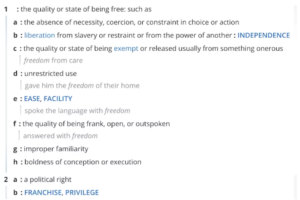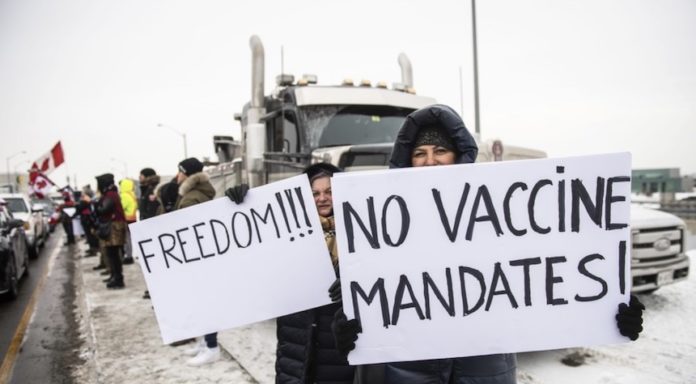I consider myself a thoughtful and artistic writer. I carefully weigh the words that I write. I like a certain dramatic flare, a certain flourish if you will. When all is said and done, I consider myself an artist.
After reading an article by the Canadian Broadcast Corporation (CBC), I am at a loss for words. It discussed how freedom has become a “far-right” buzzword. After much deliberation and contemplation, and many other synonyms for “thinking”, I finally decided that honesty was the best way to approach this topic.
Crazytown’s craziest article I have ever seen. Canada, what the hell?
What is the premise?
This article was written for the CBC program Cross Country Checkup. The writers are Very Concerned, especially in relation to the Canadian Freedom Convoy, which protested the COVID lockdowns.
The term is often associated with protests or rallies in the United States. It has taken root among the Freedom Convoy protesters, who arrived in Ottawa in January. They have become a fixture in Ottawa’s downtown.
Freedom is an open concept for many — it’s open to interpretation.
The word freedom is not open to interpretation. It is a static word, similar to the word “word.” Here’s Merriam-Webster’s definition.

The subsections of the word can be thought of as slightly different concepts of the exact same word. It is a fundamental concept. The CBC pretends it’s not.
But, wait! There’s more!
It is a term that has resonated… It is possible to define and understand it, and then manipulate it in a way that makes sense and is useful to your eyes depending on your perspective,” she explained to Cross Country Checkup.
Perry, one expert who says far-right groups are growing in Canada, added that it’s also a term that thrives among far-right organizations.
Perry observed that freedom is a sign of freedom, as seen by some protesters who oppose vaccine mandates or other public health measures.
“Freedom indicates a desire to be free from government interference or overreach.” This is what I don’t see. Maybe that’s a sign that, although I was born in Canada, I don’t consider myself a Canadian since I moved to the United States at 18.
The whole article made me itchy and raised a few questions.
What does “the term” mean in relation to one’s human rights? Is it acceptable to use the dictionary definition of freedom?
Although the CBC offers many examples of freedom, it fails to define what it is.
“Freedom is slippery,” stated Elisabeth Anker (associate professor of political science, George Washington University) and author of Ugly Freedoms. This book examines the history of freedom as a concept in American society.
“On the extreme right, [individual liberty] can often be translated as someone who refuses to accept norms of equality, treating everyone equally, or norms to remedy inequalities, regardless of whether it’s trying to correct racial or gender discrimination.”
Professor Anker, that sounds more like a “you’ problem than a problem for “them.” You could have stopped her analysis at “refuses not to be bound.” In healthy societies, where everyone respects each other’s freedoms (especially when it comes down to government), logic would dictate that these people are free to oppose vaccines and masks as well as the cranky nanny-state proponents. Everyone else is free to ignore them. You can choose to remain home or to mask up or move to a country that loves masks like China. You can yell at people as they walk by, or stand on the street with their whole faces visible for all to see. You can be against them.
Freedom is a two-way street unless you are an elitist or socialist, or pseudo-intellectual. It’s actually a pair of handcuffs and only certain people can keep the keys.
What is the proper use of the word? To repeat the above quote, freedom signals a desire to be free from government interference or overreach. The “experts” in this article suggest that it is a bad idea. We must assume that there is another better thing, a better definition, that is not the same as the very bad idea of being free to make your own decisions. The “experts” claim that freedom should be understood to mean accepting government intervention and welcoming government intervention.
Just recently, I looked at Merriam-Webster’s definition and it said exactly the opposite. Who are these people manipulating the word to their own ends?
In case you didn’t know, it’s the CBC. It’s them. They are strangers.
I can understand why freedom is a rallying call for those seeking to be free from oppression by the government – from American slaves to Canada’s Freedom Convoy to the suffragette movements to Canada’s Freedom Movement. It is not clear why freedom advocates have advocated for it.
The question isn’t whether anyone who fights oppression of any kind would want freedom… the question is why does the CBC not.










